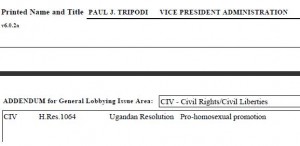Documents have been released demonstrating the process behind hiring George Rekers as an expert in the FL gay adoption case. His staff opposed hiring Rekers due to bias Rekers had demonstrated in prior cases and in his writings.
McCollum’s office was brought in by the Department of Children and Families to defend the state’s three-decade old ban on gay adoption after it was challenged by Martin Gill. Gill is a North Miami man who wanted to adopt two foster children that are living with him and his partner.
Records show that DCF did not want to hire Rekers as an expert witness in the lawsuit because he wanted to charge $300 an hour. DCF only agreed to his hiring after McCollum strongly recommended it.
The state considered over 30 other people who declined.
The e-mails released Thursday show that an attorney in McCollum’s own office warned against hiring Rekers, whose testimony had been deemed suspect in an earlier Arkansas lawsuit that challenged a ban on placing foster children in homes with gay parents.
Assistant Attorney General Valerie Martin wrote in a July 2007 e-mail that after talking to Arkansas officials and reviewing the background of the former University of South Carolina professor that she would “recommend NOT using him.”
E-mails also show that during a conference call Martin — who said the state considered more than 30 possible expert witnesses — was ordered to hire Rekers “against my strong cautions.”
This is an interesting revelation. I was one of those 30 people contacted by the FL AG’s office. I declined the request because I did not think the law was defensible or appropriate.
There are other aspects of this situation that are disturbing. For instance, Rekers testified that Native Americans could be excluded from adopting because of high rates of substance abuse, domestic violence, and suicide as compared to other groups. Subsequently, McCollum’s office defended Rekers’ status as an expert. Rekers offered a legal basis for discrimination and he was defended in a later appeal. In the appeal of the lower court’s findings (allowing the children to stay with their gay parent), McCollum says gays and lesbians have higher rates of problems on a variety of distressing conditions and this is one reason they should be excluded. He erroneously said no one from his side argued that distressing conditions alone would be a valid reason to exclude an entire class. However, Rekers did say Native Americans could be excluded on the same basis as McCollum argues that gays can be.
I hope to lay this out with references next week.
